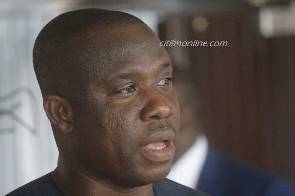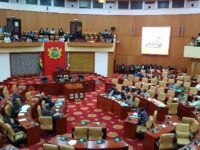
The Supreme Court has set a new date for judgment in the high-profile case concerning four vacated parliamentary seats, with a ruling now expected on November 11, 2024. This legal dispute was initiated by Majority Leader Alexander Afenyo-Markin against Speaker of Parliament Alban Bagbin.
During the latest court session, the Attorney General (AG) raised significant concerns regarding Speaker Bagbin’s legal representation. The AG challenged the legitimacy of Bagbin’s continued use of private attorney Thaddeus Sory.
The AG referred to a letter from December 2022, which explicitly denied a request from the Speaker’s office to hire external legal counsel, insisting that the Speaker should rely solely on the legal services provided by the AG’s department.
As the hearing unfolded, the AG maintained that the absence of PPA approval rendered the Speaker’s choice of private counsel unlawful.
Background of the Case
At the heart of this case is Speaker Bagbin’s decision to declare four parliamentary seats vacant, a move he made under his interpretation of Article 97(1)(g) of the Ghanaian Constitution. This ruling has sparked considerable legal and political controversy.
Majority Leader Afenyo-Markin has argued that Bagbin exceeded his constitutional authority by unilaterally vacating the seats without judicial oversight or the option for by-elections. In response to this contention, the Supreme Court issued an interim injunction to halt the implementation of the Speaker’s ruling while the matter is decided.
Seeking to overturn the Court’s interim injunction, Speaker Bagbin submitted an application claiming that the Supreme Court does not have the jurisdiction to stay parliamentary decisions, as these rulings are non-judicial. His counsel, Thaddeus Sory, argued that judicial involvement in parliamentary decisions threatens the principle of separation of powers outlined in the Constitution.
Court’s Position
Chief Justice Gertrude Torkornoo delivered a decisive ruling, rejecting Bagbin’s application and affirming the Court’s authority to intervene when parliamentary actions are alleged to violate constitutional provisions. She emphasized the risk of disenfranchising constituents who could lose their representation without the possibility of by-elections, especially as Ghana approaches the December 7 general elections.
The Chief Justice directed both parties to submit their statements of claims within seven days to ensure a swift resolution of the substantive issues at hand.
Implications for Parliamentary Authority
As the Supreme Court gears up for its ruling on November 11, the ongoing debate over the legality of Speaker Bagbin’s choice of counsel remains unresolved. The AG’s objections highlight the complex interplay between parliamentary authority and judicial oversight, raising essential questions about the limits of power within Ghana’s government structure.
This case continues to reflect broader concerns regarding the separation of powers, the extent of parliamentary authority, and the judiciary’s role in maintaining constitutional integrity.
END





